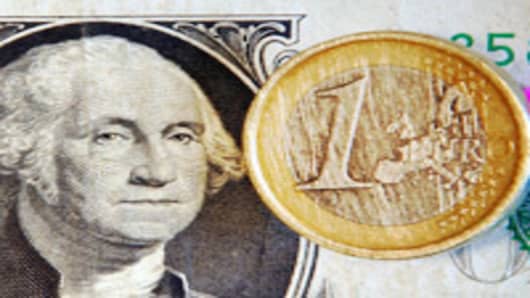The dollar fell to a record low against the euro Thursday, but pared losses as European Central Bank President Jean-Claude Trichet did not drastically change his growth and inflation views for the euro zone.
The greenback's recovery was also helped by Trichet's remarks that recent volatility on foreign exchange markets was excessive and was to be deplored.
Analysts said that while Trichet's comments confirmed the ECB was not yet ready to cut interest rates, they were largely in line with expectations and offered no element of surprise.
That allowed traders to cut back on some long euro positions that had been built up going into the ECB press conference.
The central bank left its benchmark refinancing rate at 4 percent, as the market had expected.
"Going into the press conference, the expectation was for him to surprise the market and be more hawkish. He basically kept the same tone," said Mark Meadows, senior currency strategist at Tempus Consulting in Washington. "I think people are focusing a little bit more on his comments that upcoming growth may slow."
In New York morning trading, the euro was flat against the dollar, after surging to an all-time peak of $1.5912 in overnight trade, according to Reuters data.
The dollar was little moved by a report showing that the U.S. trade deficit widened unexpectedly to $62.3 billion in February from $59.0 billion in January.
"There is a large option (barrier) above $1.5925. The market has some short-term longs and decided to dump them," said Brian Dolan, chief currency strategist at Forex.com in Bedminster, New Jersey.
"There is nothing I can see from Trichet's speech to give a reason to sell the euro at this point. He is still upbeat about the prospects for euro zone growth and he maintained his hawkish rhetoric on inflation."
The ECB's inflation-focused stance contrasts with that of the U.S. Federal Reserve, which has slashed rates by three percentage points since September to 2.25 percent and is expected to cut at least another quarter point in late April.
As well as prospects for further unfavorable moves in yield differentials, the dollar came under pressure from a selloff in stocks fueled by concerns about the U.S. banking sector.
The euro earlier scaled historic peaks versus sterling at 80.29 pence but gave up the gains after the Bank of England cut interest rates by only a quarter percentage point, although it highlighted inflation risks.
The yen benefited from a broad pickup in Asian currencies after the Monetary Authority of Singapore re-centered the Singapore dollar's trade-weighted band, pushing up the currency by as much as 1.4 percent against the dollar.
The dollar fell against the yen, as did the euro .
The fall in global equity markets helped the low-yielding Japanese currency as well as the safe-haven Swiss franc.


